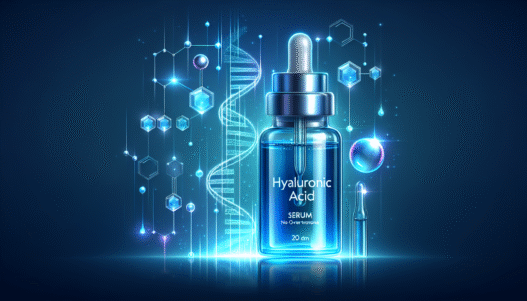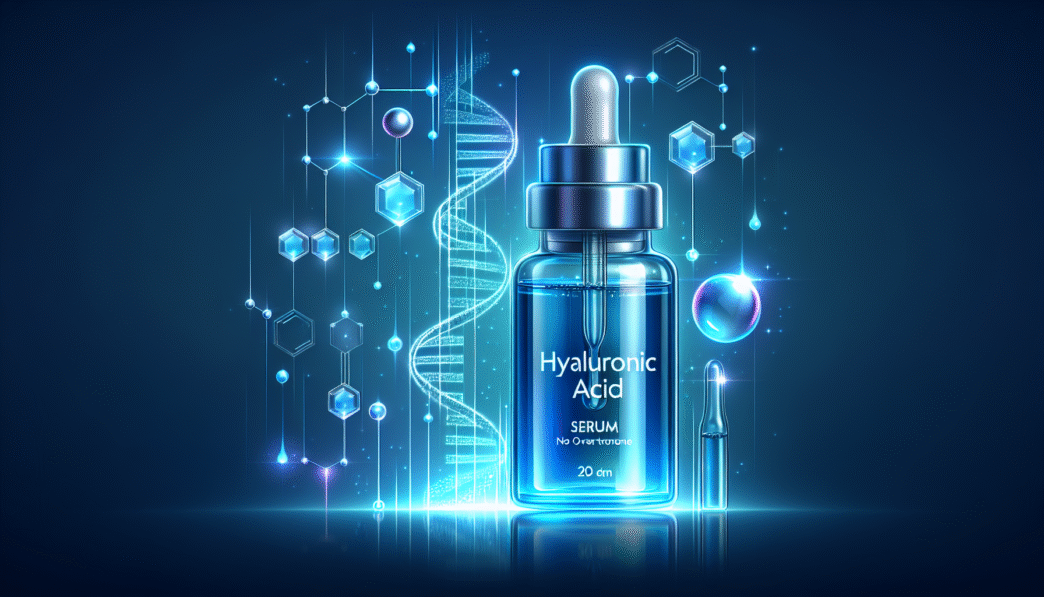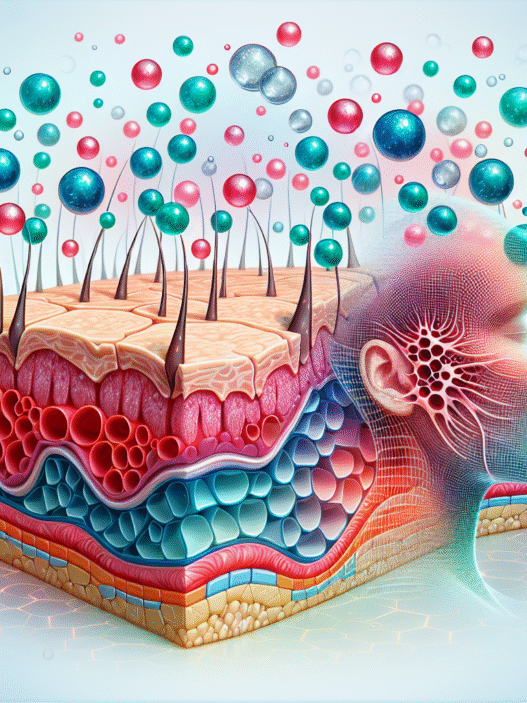Understanding Hyaluronic Acid
Introduction to Hyaluronic Acid
Hyaluronic acid is a naturally occurring substance in the human body, predominantly found in connective tissues, skin, and synovial fluid. It plays a crucial role in maintaining skin hydration and elasticity. As people age, hyaluronic acid levels decrease in the outer layer of the skin, leading to dryness and reduced elasticity (Medical News Today). Each molecule of hyaluronic acid can hold up to 1,000 times its weight in water, making it a powerful humectant in skincare formulations (Healthline).
| Key Characteristics | Information |
|---|---|
| Molecular Weight Capacity | Can hold up to 1,000 times its weight in water |
| Main Function | Hydration and plumping of the skin |
| Importance in Aging | Decreases with age, leading to dryness and loss of elasticity |
The Role of Hyaluronic Acid in Skincare
In skincare, hyaluronic acid is lauded for its ability to enhance hydration and improve skin texture. It fills the skin with moisture, firming facial contours and resulting in a youthful appearance (Cosmedica Skincare). When applied topically, it penetrates the skin to bind water to skin cells, providing moisture at all layers and leading to improved elasticity and firmness.
Incorporating a hyaluronic acid serum into one’s daily skincare regimen can significantly reduce the appearance of wrinkles and improve overall skin health. As a versatile ingredient, it pairs well with other active components, enhancing the effectiveness of creams or serums for a revitalized complexion.
The combination of hydrating properties and anti-aging effects makes hyaluronic acid indispensable in achieving and maintaining healthy skin. For those interested in more specific benefits, explore our section on hyaluronic acid benefits and how it interacts with collagen to improve skin texture and firmness.
Benefits of Hyaluronic Acid
Hyaluronic acid has gained popularity in the skincare community for its numerous benefits. This versatile molecule plays a key role in skin hydration, elasticity, and overall skin health.
Hyaluronic Acid for Skin Hydration
Hyaluronic acid is highly effective in retaining moisture in the skin. It can hold up to 1,000 times its weight in water, making it an excellent humectant that helps to keep the skin hydrated by slowing the rate of water evaporation from the skin’s surface (Healthline). By drawing moisture from the environment, it provides lasting hydration that is essential for maintaining a healthy, plump appearance.
Hyaluronic acid can hold about one and a half gallons of water per quarter-teaspoon, showcasing its exceptional ability to hydrate and rejuvenate the skin.
| Hydration Capacity | Water Weight |
|---|---|
| Hyaluronic Acid | 1,000 times its weight |
Hyaluronic Acid for Skin Elasticity
In addition to hydration, hyaluronic acid plays a vital role in improving skin elasticity. Its hydrating properties contribute to maintaining skin’s firmness and bounce, which can diminish as a result of aging or environmental factors. Proper hydration is key for elasticity, as it keeps skin cells plump and healthy.
As skin loses moisture with age, the elasticity decreases. Regularly using products containing hyaluronic acid can help combat these effects, promoting a youthful appearance and enhancing skin resilience.
Topical vs. Oral Hyaluronic Acid
Hyaluronic acid can be taken both topically and orally, leading to beneficial effects for the skin. Topical applications, such as serums and moisturizers, are applied directly to the skin surface. They provide immediate hydration and can help improve the appearance of fine lines and wrinkles. For more information on these applications, visit our article on hyaluronic acid moisturizer.
On the other hand, oral hyaluronic acid supplements have gained popularity for their potential benefits in skin hydration and elasticity, as well as joint health. Some studies suggest that oral supplementation can help improve skin moisture levels and reduce the appearance of wrinkles.
| Form | Delivery | Benefits |
|---|---|---|
| Topical | Direct application | Immediate hydration, wrinkle reduction |
| Oral | Supplements | Increased skin moisture, anti-aging effects |
Hyaluronic acid proves to be a versatile ingredient in the realm of skincare, providing essential hydration and promoting elasticity. For further insights into its effects, consider exploring hyaluronic acid benefits or how it can aid in addressing hyaluronic acid and wrinkles.
Hyaluronic Acid in Skincare Products
Hyaluronic acid is commonly used in a variety of skincare products due to its impressive hydrating properties. This section provides insights into the different forms of hyaluronic acid products available, including topical applications, injectables, and specialized serums and moisturizers.
Topical Applications of Hyaluronic Acid
Topical applications of hyaluronic acid are widely recognized for their ability to enhance skin hydration. Hyaluronic acid acts as a humectant, which means it retains water in the skin and helps maintain moisture levels. Over-the-counter products like serums, creams, and lotions are specifically formulated to deliver hyaluronic acid in effective concentrations Cleveland Clinic.
The following table outlines some popular topical products and their key ingredients:
| Product Name | Formulation Type | Key Ingredients |
|---|---|---|
| The Ordinary Natural Moisturizing Factors + HA | Moisturizer | Amino acids, glycerin, fatty acids, triglycerides, hyaluronic acid |
| Neutrogena Hydro Boost Water Gel | Gel Moisturizer | Hyaluronic acid, glycerin, dimethicone |
| CeraVe Hydrating Hyaluronic Acid Serum | Serum | Hyaluronic acid, ceramides, vitamin B5 |
Injectable Hyaluronic Acid Products
Injectable hyaluronic acid products, often known as dermal fillers, are commonly used for cosmetic procedures. They are FDA approved for skin rejuvenation and can provide volume and hydration to the skin. Additionally, hyaluronic acid injections are considered safe for alleviating knee pain in individuals with mild to moderate osteoarthritis, though they may cause temporary swelling and discomfort shortly after treatment Medical News Today.
Injectables are not only used for aesthetic purposes but also for medical applications. Here is a quick overview:
| Injectable Type | Purpose | Approval Status |
|---|---|---|
| Dermal Fillers | Skin volumization and wrinkle reduction | FDA approved |
| Hyaluronic Acid Injections | Knee pain relief in osteoarthritis | FDA approved |
Hyaluronic Acid Serums and Moisturizers
Hyaluronic acid serums and moisturizers are formulated to provide concentrated hydration. Serums typically contain higher concentrations of hyaluronic acid than standard moisturizers, making them ideal for targeted treatment. They can be layered under other skincare products for added moisturization and effectiveness.
| Type | Description | Recommended Use |
|---|---|---|
| Hyaluronic Acid Serum | Lightweight, concentrated formula | Use after cleansing and before moisturizer |
| Hyaluronic Acid Moisturizer | Cream or gel-like product with hyaluronic acid | Use as a final step in the skincare routine |
Products like hyaluronic acid moisturizers offer significant hydration, resulting in plump and radiant skin. For those curious about the overall advantages of hyaluronic acid, exploring its benefits may provide additional motivations for including it in their skincare regimen.
Understanding the different applications of hyaluronic acid in skincare helps beauty enthusiasts make informed choices about the products best suited for their needs. For anyone considering hyaluronic acid injections or exploring natural ways to enhance hydration, embracing this ingredient can lead to noticeable improvements in skin health.
Hyaluronic Acid and Skin Health
Hyaluronic acid plays a crucial role in promoting skin health through various mechanisms. This section explores its benefits for wound healing, anti-aging, and acne scarring.
Hyaluronic Acid for Wound Healing
Topical applications of hyaluronic acid may assist in wound healing by regulating inflammation. It helps increase the moisture content in the skin, which reduces the appearance of wrinkles while improving wound healing (Medical News Today). This powerful compound can retain water and hold up to 1,000 times its weight in water molecules, making it effective in the healing process (Healthline).
| Benefit | Description |
|---|---|
| Moisture Retention | Holds up to 1,000 times its weight in water, enhancing hydration |
| Inflammation Regulation | Assists in reducing inflammation at the wound site |
| Skin Appearance | Reduces the visibility of wrinkles and improves skin texture |
Hyaluronic Acid for Anti-Aging
The long-term use of hyaluronic acid serum or supplements can improve overall skin health and enhance flexibility and elasticity, leading to increased softness and stretchiness. Combined with retinol, hyaluronic acid becomes a potent ally in anti-aging efforts due to its collagen-stimulating properties. Additionally, it acts as a humectant, drawing in moisture to provide lasting hydration, which is vital for reducing signs of aging (SKIN SOFTWARE & Cosmedica Skincare).
| Anti-Aging Benefit | Description |
|---|---|
| Improved Elasticity | Enhances skin stretchiness and moisture levels |
| Hydration | Provides lasting hydration, critical for youthful skin |
| Collagen Stimulation | Encourages collagen production, reducing wrinkles |
Hyaluronic Acid for Acne Scarring
Hyaluronic acid is commonly used in fillers to repair scars caused by acne. While there is some success in repairing these scars, evidence for its effectiveness alongside other acne medications remains limited (Cleveland Clinic). Its ability to retain moisture may aid in improving the overall appearance of skin texture post-acne.
| Acne Scarring Benefit | Description |
|---|---|
| Scar Repair | Used in fillers to reduce the appearance of acne scars |
| Moisture Retention | May improve skin texture by retaining moisture |
Hyaluronic acid continues to be a key ingredient in not just skincare but also in promoting healthy skin regeneration and repair. For more on its applications, check our sections on hyaluronic acid and skincare and its various hyaluronic acid benefits.
Combinations with Hyaluronic Acid
Hyaluronic acid is known for its remarkable hydrating properties, but it also works well in conjunction with various other skincare ingredients. By pairing it with specific components, individuals can enhance its benefits and achieve optimal skin health.
Hyaluronic Acid with Vitamin C
Combining hyaluronic acid with vitamin C creates a powerful duo for enhancing skin hydration and brightening the complexion. Hyaluronic acid provides intense moisture, while vitamin C helps to reduce dark spots and improve skin tone. Together, they can make the skin appear plumper and more youthful.
| Ingredient | Primary Benefit |
|---|---|
| Hyaluronic Acid | Hydration and plumping |
| Vitamin C | Brightening and antioxidant protection |
For those interested in further exploring the advantages of hyaluronic acid, check out our article on hyaluronic acid benefits.
Hyaluronic Acid with Retinoids
Hyaluronic acid complements retinoids, making it an ideal companion in skincare regimens. Retinoids, known for their anti-aging effects, can sometimes cause side effects like dryness and irritation. Hyaluronic acid helps to soothe the skin and mitigate these potential issues. This pairing allows users to reap the benefits of retinol without the worries of excessive dryness or flaking (SKIN SOFTWARE).
| Ingredient | Primary Benefit |
|---|---|
| Hyaluronic Acid | Hydration and soothing properties |
| Retinoids | Anti-aging and collagen stimulation |
For more information on how hyaluronic acid functions as an anti-aging tool, explore our article on hyaluronic acid anti-aging.
Hyaluronic Acid with Niacinamide
The combination of hyaluronic acid and niacinamide is particularly beneficial for those with sensitive skin. Together, they enhance moisture retention, regulate oil production, and promote a brighter complexion. This duo works well to hydrate the skin without causing irritation or breakouts, making it suitable for various skin types (Go-To Skincare).
| Ingredient | Primary Benefit |
|---|---|
| Hyaluronic Acid | Intensive hydration |
| Niacinamide | Oil regulation and skin barrier support |
Individuals looking to incorporate niacinamide into their routine alongside hyaluronic acid can also read more about how these ingredients complement each other in hyaluronic acid and skin care.
By understanding how hyaluronic acid interacts with other active ingredients, beauty and skincare enthusiasts can craft effective routines tailored to their individual skin needs.
Safe Use of Hyaluronic Acid
Understanding how to safely incorporate hyaluronic acid into a skincare regimen is essential for maximizing its benefits. Both over-the-counter and prescription products are available, each serving specific needs.
Over-the-Counter Hyaluronic Acid Products
Over-the-counter hyaluronic acid serums and other topical products, such as creams and lotions, are widely available and considered safe for application. These products are designed to hydrate and plump the skin, making them particularly beneficial for individuals focusing on skin rejuvenation. Eye care products containing hyaluronic acid are also deemed effective for moisture retention.
| Product Type | Description |
|---|---|
| Serums | Concentrated formulas for deep hydration |
| Creams | Thicker textures for prolonged moisture |
| Lotions | Lightweight options for daily use |
| Eye Care Products | Targeted hydration for delicate eye skin |
It is important to ensure that any topical hyaluronic acid product is used as instructed to avoid potential irritation. While topical applications are generally safe, it is prudent to consult with a healthcare provider before using oral supplements of hyaluronic acid to ensure proper usage (Cleveland Clinic).
Prescription Hyaluronic Acid Products
Prescription hyaluronic acid products often include injectable formulations used in cosmetic procedures. These should only be administered by licensed medical professionals such as dermatologists or plastic surgeons. Proper administration is crucial to avoid complications.
| Product Type | Use |
|---|---|
| Injections | Enhance volume in targeted areas |
| Prescription Creams | Treat specific skin conditions |
Patients should always adhere to the guidance provided by their healthcare provider when using prescription products. Self-administration or misuse can lead to adverse effects (Cleveland Clinic).
Considerations for Hyaluronic Acid Use
While hyaluronic acid is naturally found throughout the body in places like the eyes, joints, and skin, certain considerations should be taken into account when using it in products. Individuals with specific skin issues or allergies should patch-test products first.
- Skin Type: Individuals with oily skin may prefer lighter formulations while those with dry skin may benefit from richer creams.
- Combination Products: Hyaluronic acid complements other ingredients such as retinol, enhancing hydration and minimizing irritation (SKIN SOFTWARE).
- Usage Frequency: It’s advisable to introduce hyaluronic acid gradually into a skincare routine to assess tolerance.
For those interested in the benefits of hyaluronic acid, exploring options like hyaluronic acid for skin, hyaluronic acid moisturizers, and hyaluronic acid injections can further enhance their skincare routine.





















